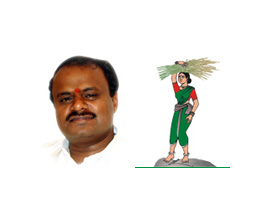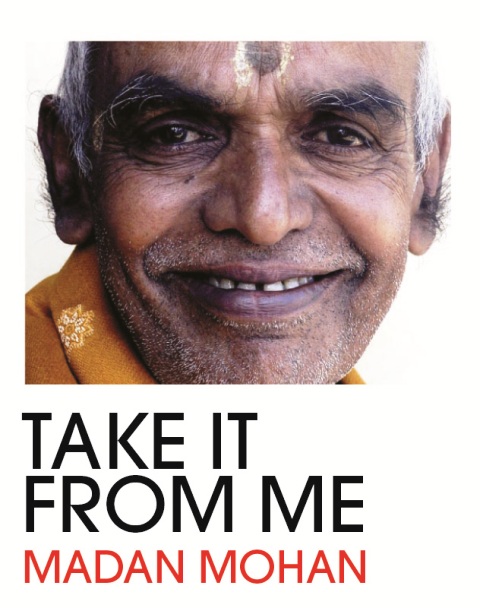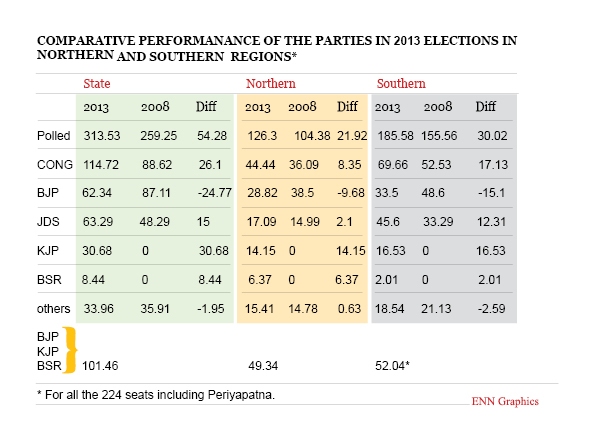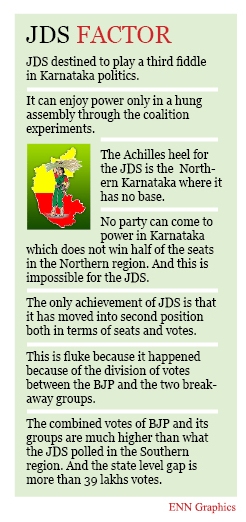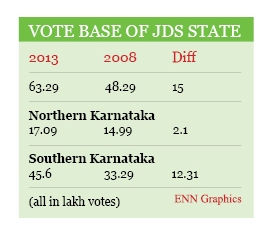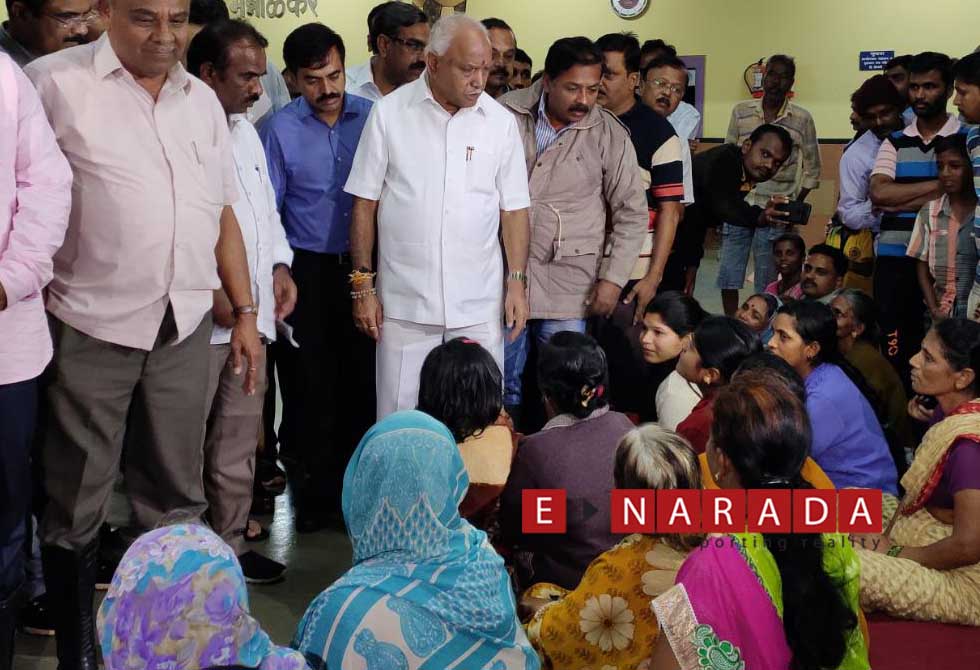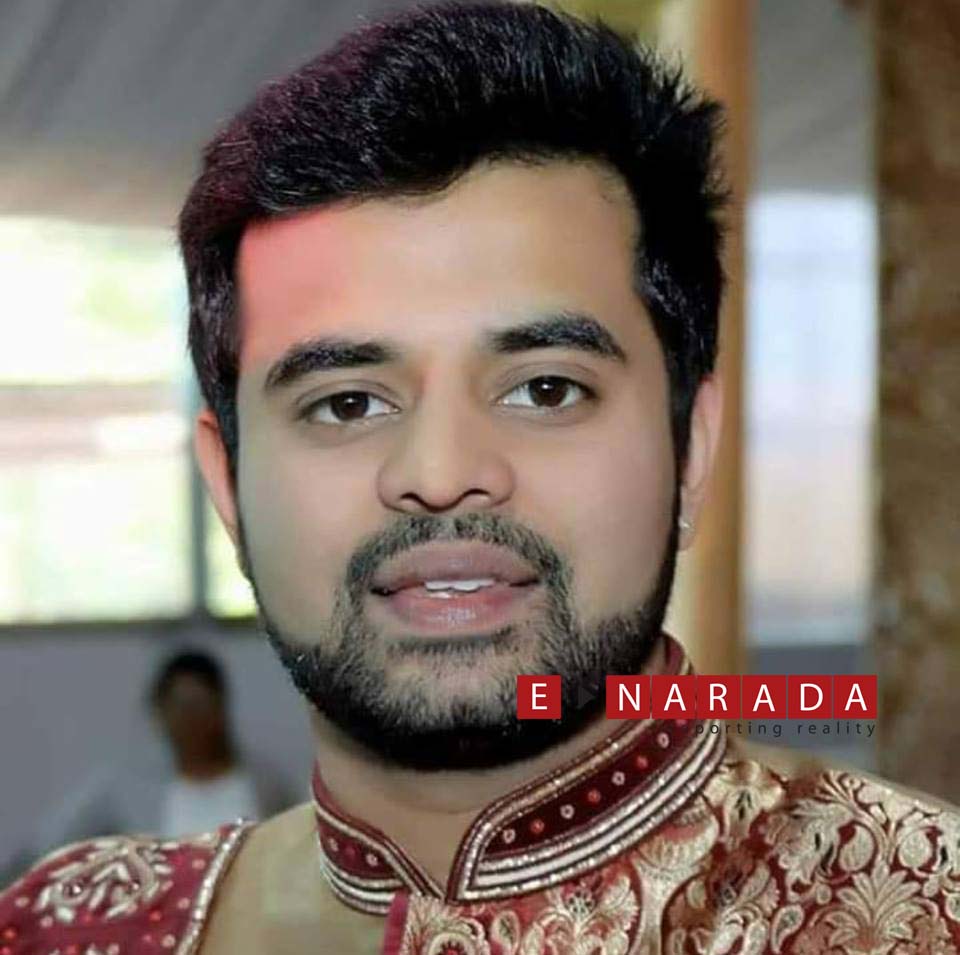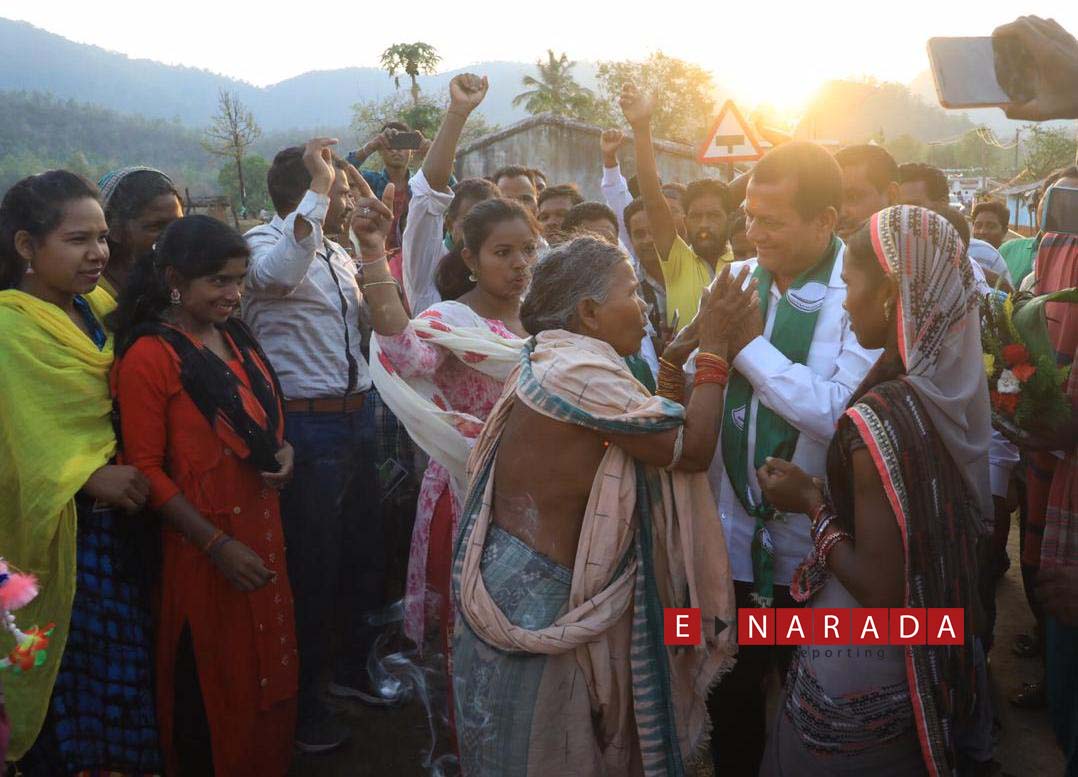As the things stand today, the prospects of any upward political movement for the Janata Dal (S) of Devegowda-Kumaraswamy duo appear quite dim in Karnataka, notwithstanding the desire of the patriarch politician cum founder to achieve the objective within his life time. (And incidentally, going by Devegowda’s words, this is going to be his last election)
Ever since the party broke out from the parent party to seek an independent political identity was back in 1999, Gowda has been unable to put his party in driver’s seat in Karnataka politics. This has been made amply clear by the Karnataka electorate not only in one election but the four elections held in a row including the just concluded one. With the Congress and the BJP vying for the top slot and sharing the top two positions, the JDS has no alternative but to remain struck in the third groove, almost on a permanent basis.
There has been a slight change in its position in the just concluded assembly elections. It has overtaken the BJP to occupy the number two position. But for all practical purposes it is a fluke. This occurred mainly because the BJP had witnessed two splits in the party and both the parent and the two breakaway groups, namely the KJP and the BSR Congress were in the electoral Frey and as a matter of fact polled more votes than last time. Since the BJP votes were divided, the JDS founds itself moving up marginally. The combined vote base of the BJP and the two breakaway groups comes around 101 lakhs as against 62 lakhs of the JDS. And the three groups are expected to come together anytime from now for their sheer political survival and when it happens the JDS would have no alternative to return to its original third slot.
Its only chance to come to pivotal position lies in the event of hung assembly, as had happened in 2004. Gowda and Kumaraswamy played their cards skillfully, to manipulate the situation to their advantage. First the JDS went in for an alliance with Congress and halfway through ditched it in favor of fresh alliance with the BJP, so that it enjoyed power for the full term, while the Number 1 and No. 2 parties, had to be satisfied with power for about twenty months each.
The party therefore has lot of stakes in the hung verdict and it was with this end in view, the JDS went all alone in the2013 election, hoping for a return of the 2004 situation, which would put it in the role of a king maker in Karnataka>(This incidentally was also the desire of Yeddyurappa of the KJP). But the electorate thought otherwise.
The basic problem with the JDS is that it has not been able to build a pan Karnataka image like its political rivals for historical reasons. The JDS, it may be noted here is the remnant of the short-lived political experiment made in eighties in Karnataka of floating the third front. Initially it was a success, which was replicated at the Centre but it proved to be a political disaster, with the fratricidal quarrel taking its toll.
Mr. Devegowda broke away from the parent party to float his won present outfit, mainly because he had a pathological aversion for Ramakrishna Hegde. Both the factions found themselves worsted in the 1999 poll. While JDS gamely held on, the other faction owing allegiance to Hegde folded up soon after the demise of Hegde. Devegowda did not exactly inherit the legacy automatically for the image he had created that he was anti Lingayat and Anti Northern Karnataka too. And this is proving to be costly for Devegowda, who is not able to realize his dream of piloting the party to the victory.
As a consequence, the political reach of JDS remains limited to few pockets of vokkalinga dominated districts of Old Mysore and it has hardly any base in Northern Karnataka and Districts of Dakshina Kannada and Udupi., In a region, which has the reputation of propelling to victory any party which wins more than half of the 96 assembly seats, the JDS had won nine seats last time and the number has come down to six this time. It has just one won seat in Bombay Karnataka and five seats from the Hyderabad Karnataka and Bellary district. This is out of the 41 seats it has won all over the state.
From the point of view of the electoral base, also, the progress over the elections is not quite encouraging. From 25 lakhs in 1999, the partys base after the decimation of JDU went upto 52. lakhs in 2004 and came down to 49.43 lakhs in 2008. However there was an improvement this time. Its vote base moved up from 48.29 lakhs in 2008 to 63.29 lakhs, this time, and for the first time, it pipped the BJP for a second spot with a slightly higher share than the BJP for the 41 seats it has won including the Periapatna, as against 40 seats won by the BJP.
The JDS got bulk of the seats from the Southern Karnataka region. Of every four votes it received in its tally of 63.29 lakhs, three votes had come from the Southern Region. For the four votes the party got in the state, three votes have come from the Old Mysore region only. In the sharing of the seats, it can be noticed that the ratio stands practically 1:6 between the northern and southern regions. The contribution of northern region was a mere 6 as against 35 it got from the southern belt.
The party obviously put up a good fight in the southern region, but for which the overall tally of the Congress would have been much higher. The JDS in the process has emerged as the principal challenger for the Congress, with the BJP tagging along.
The voting pattern has revealed an interesting phenomenon. While it is bipolar practically in the Northern half between the Congress and the BIP, it is tripolar in the Southern Region with the BJP also trying to assert. The JDS would not have achieved the number 2 position in the southern half of the state but for the division of the BJP votes between the parent party and the two breakaway groups. The BJP+KJP+BSR between themselves had polled 52.23 lakh votes which is seven lakhs more than what the JDS could get in that region.
The position however is not very comfortable for the JDS. The gap in the vote base of Congress (114 lakh votes) the combined BJP/ KJP/ BSR votes (101 lakhs) is too wide to permit any optimistic guess being made about any possible improvement in the prospects of the party moving into the top two bracket..
(Posted on June 6, 2013 @ 10 pm)
(Author is a Senior Journalist and Columnist. Mobile: +91 94480 74872 Email : madan.mm@gmail.com)

